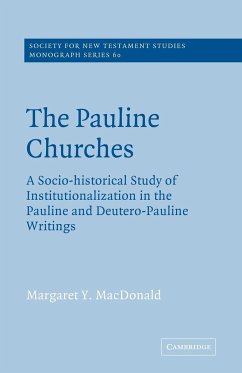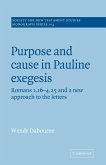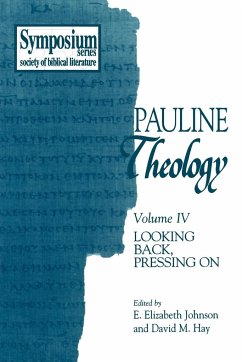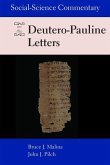The author studies the Pauline corpus in order to trace the process of institutionalisation in the Pauline communities.
The author studies the Pauline corpus in order to trace the process of institutionalisation in the Pauline communities. She claims that development can be traced since we have not only letters from Paul himself, but also the Pastoral epistles from the beginning of the second century, as well as Ephesians and Colossians, writings which are characteristic of the ambiguous period following the disappearance of the earliest authorities. This is the first substantial examination of the Pauline corpus from this angle; it also incorporates effectively insights from the social sciences.
Table of content:
Preface; Abbreviations; Introduction; 1. The project; 2. The social sciences and New Testament interpretation; 3. Methodological limits and possibilities; 4. Where from here?; Part I. Paul: Community-Building Institutionalization: 5. Attitidues to the world/ethics; 6. Ministry; 7. Ritual; 8. Belief; 9. General conclusion; Part II. Colossians and Ephesians: Community-Stabilizing Institutionalization: 10. Attitudes to the world/ethics; 11. Ministry; 12. Ritual; 13. Belief; 14. General conclusion; Part III. The Pastoral Epistles: Community-Protecting Institutionalization: 15. Attitidues to the world/ethics; 16. Ministry; 17. Ritual; 18. Belief; Conclusion; Notes; Bibliography; Index of Biblical passages discussed; Subject index.
Hinweis: Dieser Artikel kann nur an eine deutsche Lieferadresse ausgeliefert werden.
The author studies the Pauline corpus in order to trace the process of institutionalisation in the Pauline communities. She claims that development can be traced since we have not only letters from Paul himself, but also the Pastoral epistles from the beginning of the second century, as well as Ephesians and Colossians, writings which are characteristic of the ambiguous period following the disappearance of the earliest authorities. This is the first substantial examination of the Pauline corpus from this angle; it also incorporates effectively insights from the social sciences.
Table of content:
Preface; Abbreviations; Introduction; 1. The project; 2. The social sciences and New Testament interpretation; 3. Methodological limits and possibilities; 4. Where from here?; Part I. Paul: Community-Building Institutionalization: 5. Attitidues to the world/ethics; 6. Ministry; 7. Ritual; 8. Belief; 9. General conclusion; Part II. Colossians and Ephesians: Community-Stabilizing Institutionalization: 10. Attitudes to the world/ethics; 11. Ministry; 12. Ritual; 13. Belief; 14. General conclusion; Part III. The Pastoral Epistles: Community-Protecting Institutionalization: 15. Attitidues to the world/ethics; 16. Ministry; 17. Ritual; 18. Belief; Conclusion; Notes; Bibliography; Index of Biblical passages discussed; Subject index.
Hinweis: Dieser Artikel kann nur an eine deutsche Lieferadresse ausgeliefert werden.








